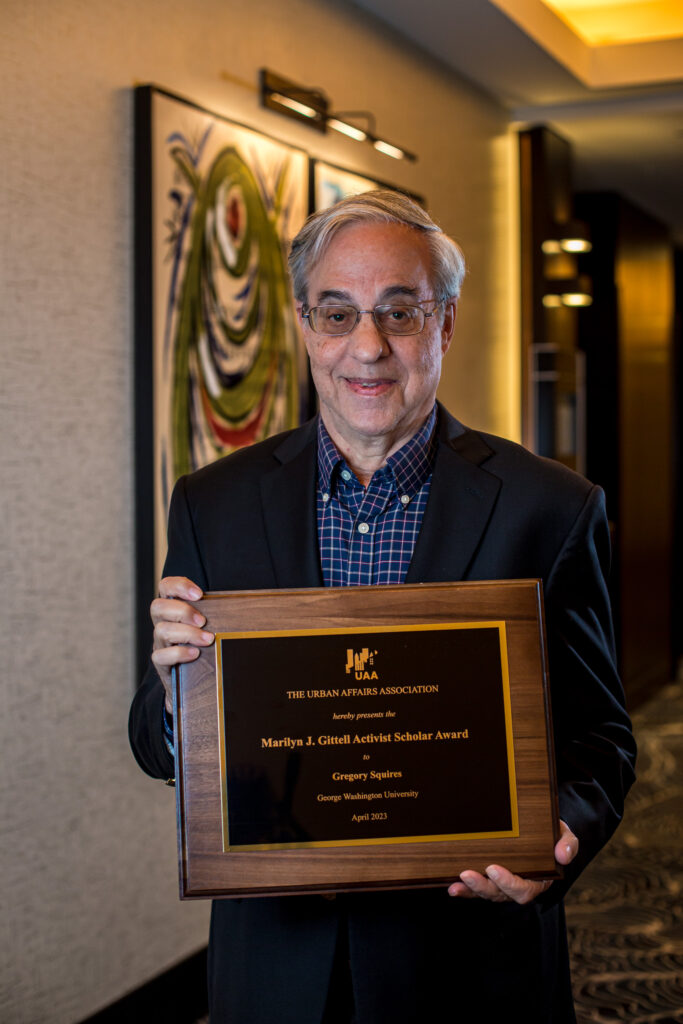Dr. Gregory Squires (George Washington University) was selected as the recipient of the 2023 Marilyn J. Gittell Activist Scholar Award sponsored by the Urban Affairs Association and SAGE Publishing.
This award was established to highlight field-based urban scholarship and promote the dissemination of work by activist urban scholars. The award is co-sponsored by SAGE Publishing and UAA. The inspiration for this award is the career of Dr. Marilyn J. Gittell, former Director of the Howard Samuels Center and Professor of Political Science at The Graduate School at City University of New York. Dr. Gittell was an outstanding scholar and a community activist who wrote seminal works on citizen participation, and was founding editor of Urban Affairs Quarterly, (now known as Urban Affairs Review). Thus, the award seeks to honor the contributions of a scholar whose research record shows a direct relationship between activism, scholarship, and engagement with community(ies).
AWARD COMMITTEE ASSESSMENT
“We believe that the breadth, depth, and longevity of Dr. Squires’ work demonstrates a career of engaged scholarship as well as activism. His career has been one dedicated to connecting that scholarly work to the continuing battle for civil rights. Squires’ work displays strong evidence of “field-based urban scholarship,” as noted in the Award description. That scholarship has, in turn, been disseminated through activities from foreclosure assistance to grant writing to pedagogy.
Dr. Squires has demonstrated clear commitment to community engagement and activism on behalf of marginalized communities, particularly in terms of urban housing and development policy. His decades-long steadfastness to these causes embodies the spirit and practice of the activist scholar.”
AWARD COMMITTEE MEMBERS
Joan Wesley, Jackson State University (Chair); Edith Barrett, Chatham University; Andrew Foell, University of Illinois-Chicago; Tyeshia Redden, Gettysburg College; Katie Singer, Independent Researcher
AWARD RECIPIENT BIO
Gregory D. Squires is a Research Professor and Professor Emeritus in the Department of Sociology at George Washington University. Prior to coming to GW he served as a Research Analyst for the U.S. Commission on Civil Rights, an Intergovernmental Personnel Act Fellow for HUD’s Office for Fair Housing and Equal Opportunity, and a Professor of Sociology and Urban Studies at the University of Wisconsin-Milwaukee. He has published 17 books, more than 75 refereed journal articles, over 30 book chapters, and approximately 125 op eds in various outlets including The New York Times, The Washington Post, Boston Herald, Philadelphia Inquirer, Chicago Tribune, Chicago Defender, La Opinion, The Progressive, The Nation, The American Prospect, American Banker, National Underwriter among others. He has served as a board member, consultant or advisor to several government and non-profit organizations including the Consumer Advisory Council of the Federal Reserve Board, National Association of Insurance Commissioners, Wisconsin and Washington DC Advisory Committees to the U.S. Commission on Civil Rights, Social Science Advisory Board of the Poverty & Race Research Action Council, Fair Housing Task Force of the Leadership Conference on Civil and Human Rights and several others. He is currently a community development columnist for Social Policy.
ABOUT THE URBAN AFFAIRS ASSOCIATION
The Urban Affairs Association (UAA) is an international professional organization for 700+ urban scholars, researchers, policy analysts, & public service providers. UAA is dedicated to creating interdisciplinary spaces for engaging in intellectual and practical discussions about urban life. Through theoretical, empirical, and action-oriented research, UAA fosters diverse activities to understand and shape a more just and equitable urban world.
In addition to hosting an annual conference, UAA sponsors ongoing professional development opportunities; Upsilon Sigma: The Urban Studies Honor Society; and two peer-reviewed journals, the Journal of Urban Affairs and the Journal of Race, Ethnicity and the City. You can find UAA on the web, Facebook, Twitter, and LinkedIn.







